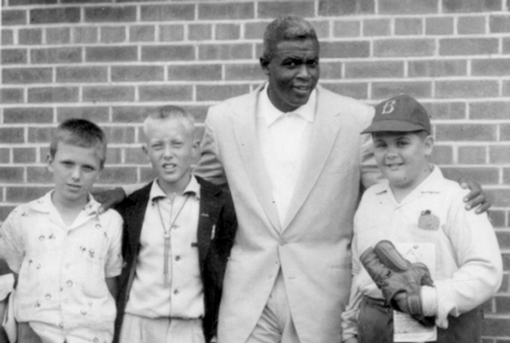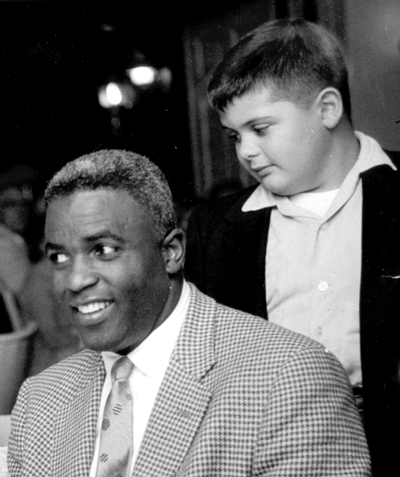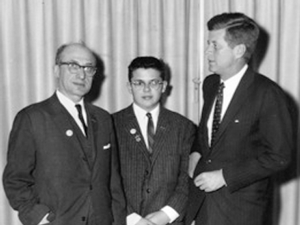History Theatre play celebrates the unlikely friendships Ron Rabinovitz forged with Jackie Robinson — and John F. Kennedy
By DORIS RUBENSTEIN
Why have our local theaters taken so long to put Ron Rabinovitz’s heartwarming story on the stage?
Rabinovitz is a longtime Minnesotan and member of Beth El Synagogue who finally has become immortalized in History Theatre’s world premiere of The Incredible Season of Ronnie Rabinovitz, written by award-winning playwright Eric Simonson. This theatrical run is only one stop in what Rabinovitz views as a continuing campaign to promote love, acceptance and tolerance through life.
Rabinovitz may be an ace box salesman for Golden Valley-based Liberty Carton Company, but his greater talent in life is making and retaining friendships with some of the 20th century’s most iconic personalities — friendships that reach beyond the grave.

Rabinovitz’s story started its trip to St. Paul’s History Theatre some 60 years ago, when he was nine years old in his native Sheboygan, Wisc. For those who haven’t already heard about his story from past articles in the American Jewish World, the Chicago Sun-Times, CBS News and other media outlets, it merits a synopsis here.
Like many boys raised in post-World War II America, young Ronnie was a huge baseball fan. Growing up in Sheboygan, he played Little League and took his turn at the plate at Camp Maccabee and Camp Moshava.
He was a fan of the hometown team, the Milwaukee Braves — until the day in 1953 when the Brooklyn Dodgers came to town with Jackie Robinson, the man who broke the color barrier in Major League Baseball.
Ronnie’s dad encouraged him to write a fan letter to Robinson, thus beginning an unanticipated lifelong friendship and correspondence.

But that’s just the first part of the story. Again, Ronnie’s father got the ball rolling on what became a second improbable friendship.
The elder Rabinovitz, an attorney who was a leader in the Wisconsin Democratic Party, met the Kennedy brothers — John and Robert — while representing the United Automobile Workers (UAW) during the historic Kohler strike in 1958; and he convinced the young Sen. John F. Kennedy to run in the Wisconsin presidential primary.
The Kennedys took the Rabinovitz family up on the offer of home hospitality and it was in an unlikely setting (I won’t spoil this for you) in the home that JFK and the boy struck up a friendship. A year later, the teenaged Ronnie was surprised to find himself in the Los Angeles Kennedy campaign office for the Democratic National Convention, rubbing elbows with Democratic hotshots from around the country.

Rabinovitz moved to Minneapolis in the 1960s to study radio broadcasting at Brown Institute and has called the city his home ever since. He uses Minneapolis as a base to travel the country to pursue his real passion: promoting the lessons of racial justice and tolerance that both of his special friends espoused.
In light of all the publicity through the years, I return to my initial question: Why have our local theaters taken so long to put Ron Rabinovitz’s heartwarming story on the stage?
Perhaps it’s because Rabinovitz is not a self-promoter, but his friend, Todd Kalman, introduced him to radio personality Timothy D. Kehr. When Kehr heard Rabinovitz’s story, he knew that it was perfect for the stage, and he shared Rabinovitz’s story with Ron Peluso, artistic director of the History Theatre.
Peluso, in turn, contacted his friend, playwright Simonson, who had written the highly acclaimed Broadway play, Lombardi, about the fabled coach of the Green Bay Packers. Simonson loved a good sports story. And it helped that Simonson, a contemporary of Rabinovitz, was born and raised in Milwaukee.
If Peluso were Jewish, he’d exclaim, “Takke shidduch (Great match)!”
Simonson is no stranger to the Twin Cities. In addition to his work as a playwright, he has directed numerous local productions, notably Silent Night, The Grapes of Wrath, and the upcoming Dreams of Valentino at the Minnesota Opera.
“I didn’t hesitate when Ron Peluso called and told me about the Ronnie Rabinovitz story,” Simonson said. “Everything appealed to me: sports, Ronnie’s story, the historically important characters. I felt that I had an opportunity here to tell new audiences about Jackie Robinson’s important work post-Dodgers, too.”
An additional appeal to writing the script was that “it was fun to write about Wisconsin people and culture.” Simonson admitted that he “tried to incorporate certain Wisconsin idioms and quirks into the play, like references to a local cheese ball factory.”
Simonson interviewed Rabinovitz extensively to prepare for writing the script and both sat in on early read-throughs with the actors in rehearsal. He tried to stick as closely as possible to the facts of Rabinovitz’s story, but both admit that some slight changes had to be made for dramatic effect.
The Incredible Season of Ronnie Rabinovitz clearly has vast appeal for the Minnesota-Wisconsin audience. But it certainly will find a place on the stages of other theaters that present plays dealing with subjects of social and racial justice, and the universal message of undying friendship.
***
The Incredible Season of Ronnie Rabinovitz will run Feb. 1-23 at History Theatre, 30 E. Tenth St., St. Paul. For tickets and information, call 651-292-4323 or visit: www.historytheatre.com.
(American Jewish World, 1.31.14)



















